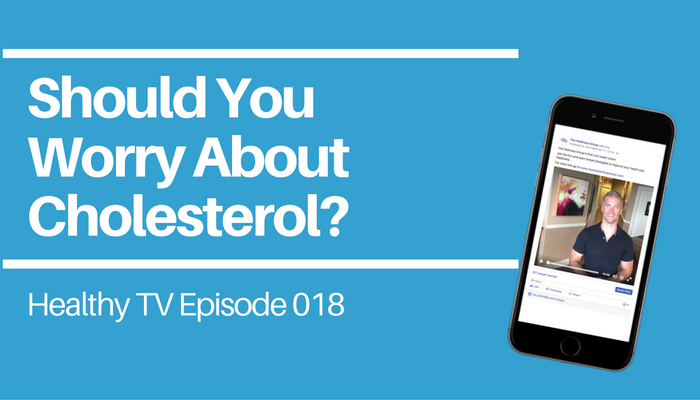Healthy TV | Episode 018
In this episode I will cover:
- The greatest myth of our generation.
- 5 ways cholesterol impacts your health.
- The link between cholesterol and your brain.
- What you need to know about your cholesterol levels.
Is Cholesterol The Devil?
Cholesterol is bad for you, right? I mean, for the past 60 years, it has been hard to find a reference to ‘cholesterol’ that wasn’t preceded by ‘artery-clogging cholesterol…’
The story goes something like this:
Foods like meat, cheese and eggs come filled with cholesterol. When we eat these foods, the cholesterol finds its way into our bloodstream and gets stuck to the insides of our arteries. Over time, this ‘artery-clogging’ cholesterol builds up, and causes hardening and narrowing of the arteries, which can kill you.
Or more simply put, eating cholesterol ‘causes’ heart disease and this has resulted in the death of millions of people worldwide.
But is this true?
I don’t blame the original researchers… In fact they made a very important and illuminating discovery: the majority of people who died of heart attacks had these hard plaques in their arteries, and these plaques were made up mostly of cholesterol and immune cells. As they expanded and looked at more and more people who were suffering from heart attacks, they consistently found their arteries ‘clogged’ with cholesterol.
In science, this is referred to as a strong correlation. Meaning: when you see 1 thing (heart attacks) you often see another thing (plaques in arteries).
Ice Cream And Shark Attacks
Let’s look at a more entertaining correlation. In Southern California, there’s a clear correlation between ice cream sales and shark attacks. When ice cream sales go up, so do shark attacks, and vice versa.
So does eating ice cream somehow cause swimmers to be more irresistible to the neighborhood sharks?
Or is it more likely some other variable that could explain both observations?
In the case of the ice cream/shark attack correlation the other variable is pretty obvious: Temperature. As it gets hotter, more people buy ice cream, AND more people go in the water, increasing the likelihood of shark attacks.
When it comes to cholesterol and heart disease the principle is the same, although in this case there are several other variables. What we do know is this:
- Dietary fat and cholesterol has little impact on actual cholesterol levels in your blood
- There are many types of cholesterol in your body and most are essential for your body to work properly
- 1 subset of cholesterol (small LDL) is associated with heart disease, but only when those molecules have been damaged (oxidised) which happens when the body is chronically unhealthy.
Watch the video and learn what you ABSOLUTELY NEED TO KNOW about Cholesterol.
 Dr. John MacPhee is a Chiropractor, speaker and passionate health and wellness expert. He has inspired thousands of people to take control of their own health using the Life By Design method. Dr. John is co-owner of The Wellness Group, the largest Life By Design Certified Chiropractic office in Canada. Apart from full-time practice, John maintains a busy speaking schedule, with a particular emphasis on improving productivity and focus at work. Otherwise, you can find John training hard at CrossFit 613, exploring Gatineau Park, or holed away studying the latest research at various cafes across the west end.
Dr. John MacPhee is a Chiropractor, speaker and passionate health and wellness expert. He has inspired thousands of people to take control of their own health using the Life By Design method. Dr. John is co-owner of The Wellness Group, the largest Life By Design Certified Chiropractic office in Canada. Apart from full-time practice, John maintains a busy speaking schedule, with a particular emphasis on improving productivity and focus at work. Otherwise, you can find John training hard at CrossFit 613, exploring Gatineau Park, or holed away studying the latest research at various cafes across the west end.
